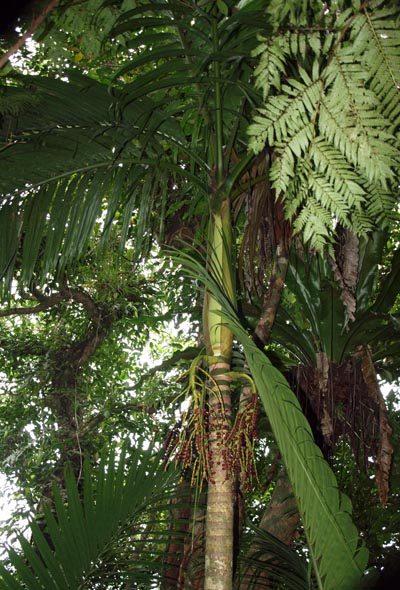Pinanga tashiroi Information
A solitary, smallish, water-loving, salt-tolerant, moderately fast growing, monoecious, forest understorey, crownshaft palm. Not known in cultivation, vulnerable in the wild. It has a smooth, greenish waxy trunk, 4.9 m. (16 ft.) tall, 20 cm. (8 inch) diameter with spaced ring leaf scars, and large segmented, pinnate (feather) leaves, 2.1 m. (7 ft.) long, 0.9 m. (3 ft.) wide, dark green above and beneath.
This plant is suitable, while young as a houseplant or conservatory plant.
Pinanga tashiroi naturally occurs on islands in moist forest, and is heavily effected by the surrounding sea temperatures, which are constant and often form sea mist and cloud. In this type of natural environment temperature fluctuations are slight, and this palm prefers a constantly hot and humid climate with little temperature difference between day & night, and Summer & Winter. This palm will not tolerate cool for very long.
Identification:
Monoecious. Trunk less than 7 m tall, 20 cm in diameter, swollen at base, grey white, solitary or possibly occasionally clumping. Leaves pinnately compound, 2 m long or more, deep green above, polished, somewhat glaucous; leaflets linear, 60 cm long 2-2.5 cm wide, veins 2-4 tomentose; sheath ca. 1 m long, rusty brown. Inflorescence a spike, infrafoliar, 45 cm long, somewhat pendulous; pistillate flower in centre, surrounded by staminate flowers; staminate flower 1-1.1 cm long 1.2 cm across, flowering in morning and falling by afternoon; sepals 3, triangular, apex acuminate, petals 3, milky, pink at tip, ovate, 1 cm long, 6-9 mm wide; stamens 36-41, 2-4.5 mm long, 0.8-1 mm wide, sessile or nearly so; anthers 4-6 mm long, 2 celled, longitudinally dehiscent; filament white, pinkish apically; pollen white; pistillate flowers ovoid, 5 mm long, 6 mm wide; sepals 3, imbricate, broadly ovate, 3 mm long, 4 mm wide; petals 3, same as sepals, ciliate; flowering July. Fruit ovoid, 1.8 cm long, 1.2 cm across; deep red to black; seed 1, ruminate.
Endemic to the Island of Lanyu (Orchid Island), Taiwan
General Information:
Through the courtesy of Mr. E. D. Meeeill, I have learnt that the palm is closely allied to the Philippine Pinanga barnesii Becc. Our palm is, however, different from that species in its taller and thicker trunks, and in its smaller fruits.
Distribution:
Native to, Taiwan
The palm is endemic to the Island of Lanyu, Taiwan. Occurs only at high elevation.
Location: Lanyu Island, Taiwan (22.059336°N, 121.517372°E)

